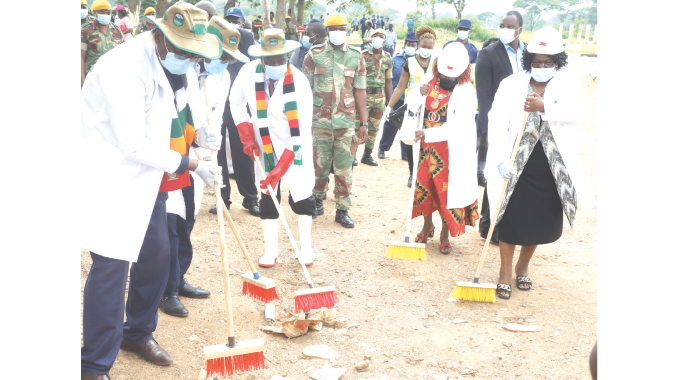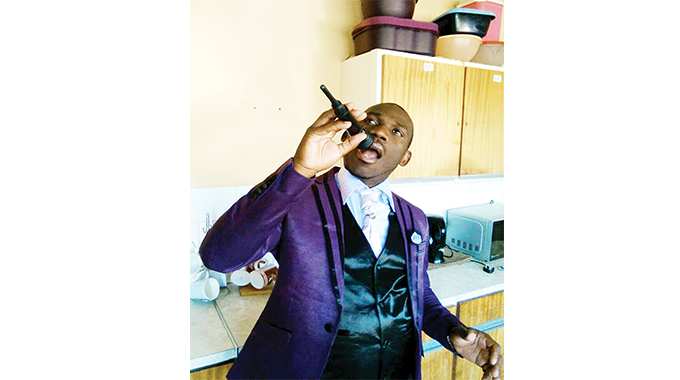President impresses on cleanliness starting from home

Patrick Chitumba, Midlands Bureau Chief
AFRICA’S cleanest city is Kigali, the capital city of Rwanda followed by Port Louis, the capital of Mauritius while Cape Town in South Africa, Tunis in Tunisia, Windhoek in Namibia and Gaborone in Botswana are some of the cleanest cities on the continent.
Zimbabwe has made strides to emulate some of these cleanest cities by adopting initiatives in line with Vision 2030 that speaks to an executive policing system and an executive waste management system.
But the culture of cleanliness according to President Mnangagwa on Friday during a national clean-up campaign, should be cultivated at home from where it then spreads to all other levels.
The national clean-up campaign that was launched by the President in 2018 is now four years old and despite having been destabilised by Covid-19 in the past two years, has moved the nation in the right direction in as far as cleanliness is concerned.
President Mnangagwa led the national clean-up campaign in Kwekwe which is one of the cleanest cities in the country.
It is in light of the President’s vision that the Ministry of Environment, Climate, Tourism and Hospitality Industry has already established a National Environmental Law Enforcement Unit which will be working together with the police to enforce cleanliness across the country.
Captains of industry have been asked to dedicate at least an hour or two every first Friday of the month to clean their working environments together with their employees on their own or risk being forced into participating in the noble cause.
In his address to captains of industry, employees and residents soon after participating in the national clean-up campaign in Kwekwe, President Mnangagwa commended Zimbabweans for embracing the programme.
“I commend Zimbabweans for embracing the programme especially at sectoral and organisational level.
There is still room however, to increase participation of the populace at household and community level.
We asked captains of industry that every first Friday of the month, they must find time to clean their working environment together with their employees.
At least an hour, maximum of two hours. Other companies are doing it and others are not.
So, don’t force me to start forcing you because I can do it,” he said.
President Mnangagwa said cleanliness should start from home.
“This cleanliness we want is not just for urban areas. But it must start from the home environment.
When we were growing up, our mothers and sisters would wake up and sweep the yard and clean the houses.
The fathers, and boys were looking after the livestock.
So, mothers, we don’t want cockroaches in our homes.
These pests invade your homes because of uncleanliness. It is because when you cook and eat at night, you don’t clean the dishes which gives them a feeding and breeding ground.
You must always make sure that before you sleep, the kitchen is clean and that way, there is no breeding environment for the cockroaches.
Even our clothes should be clean and that makes us have a clean environment.
“Outside the house, it’s not only the mothers alone, but the fathers as well to keep the clean environment.
If we all have a clean environment then, we will have a clean country.
The same goes at the workplace,” he said.
Addressing the same gathering, the Minister of Environment, Climate, Tourism and Hospitality Mangaliso Ndlovu said the clean-up campaign had in the last three years developed into a waste management multi-strategy system as the initiative continues to record success in creating a clean, safe and healthy environment.
The clean-up campaign, he said, now includes the promotion of waste recycling into sustainable and green industries at small to medium level with an encouraging uptake from women and the youths.
“Your Excellency Sir, in line with the National Development Strategy 1 priority area of recycling initiatives, I wish to report that the clean-up programme that you initiated has developed into a waste management multi strategy system and now includes the promotion of waste recycling into sustainable and green industries at small to medium level.
There is encouraging interest and uptake from the women and youths,” said Minister Ndlovu.
He said starting from next month, a system of account for participating and non-participating institutions would be in place.
“Be assured your Excellency that your vision on achieving cleanliness for the communities will continue to be re-energised time and again.
Starting from February 2022, a system to account for all participating and non-participating institutions will be in place,” he said.
“It is going to be a must for all local authorities to participate in the national clean-up’s including Government Ministries and their respective institutions as well as the business community.
There are going to be consequences for not cleaning areas of operation and to local authorities for not co-ordinating and initiating clean-ups in areas of their jurisdiction on national clean-up days.”
Minister Ndlovu said his ministry had developed and produced a recycler’s directory to facilitate market linkages between communities and recyclers for uptake of various waste streams.
Of note, he said, they have managed to secure an investor who was already at an advanced stage in putting up a waste paper recycling plant to produce paper packaging.
“We have already signed a MoU with the company for the collection of waste paper across the country.
This is a direct response to the promotion of recycling initiatives as indicated in NDS1.
My ministry in partnership with Kwekwe City Council are at an advanced stage of co-operation to have a partnership to design and construct a state-of-the-art waste landfill that is capable of handling both municipal general and hazardous waste.
This sort of infrastructure is key for a developing and expanding economy as generation of specialised waste is inevitable,” said Minister Ndlovu.
The minister expressed their desire to work with the city of Kwekwe this year to attain high standards of cleanliness to match cities like Kigali, among others.
“This is good for tourism marketing as the world is competing for tourist arrivals through clean destinations.
Cleanliness is going to be one of the major selling points,” said Minister Ndlovu.
He said 50 municipality police officers and rangers from Kwekwe, Redcliff town and Zibagwe Rural District Council have already been trained with a view to create an Environmental Law Enforcement Unit in each of the local authorities.
“There is a realisation that law enforcement is crucial in sustaining a clean, safe and healthy environment.
This is a feature that my ministry would want to cascade to other local authorities. At national level, we have already established a National Environmental Law Enforcement Police Unit working together with the police,” said Minister Ndlovu.
The national clean-up campaign programme was launched by President Mnangagwa in 2018 and is held in the spirit of creating a clean, safe and healthy environment.









Comments